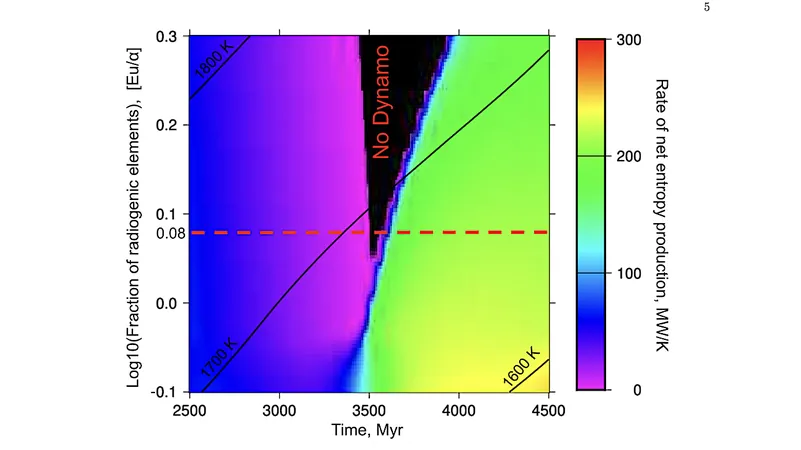
Unveiling the Role of Europium in the Milky Way: A Key Ingredient for Planetary Habitability
2024-12-02
Author: Olivia
Introduction
Recent scientific insights have shed light on the complex interplay between elements and the potential habitability of planets, particularly focusing on europium (Eu), a rare earth element. The study reveals how the distribution of europium in the Milky Way disk is closely tied to the geodynamics essential for sustaining life-sustaining environments on orbiting exoplanets.
The Role of Radioactive Decay
The energy from radioactive decay of thorium (Th) and uranium (U) isotopes, found in planetary mantles, plays a critical role in maintaining geodynamic stability. This activity is crucial for generating a planetary magnetic dynamo, which protects planets from harmful cosmic radiation and contributes to a stable atmosphere conducive to life.
Assessment of Thermal Evolution
To better assess the thermal evolution of nearby exoplanets, researchers are utilizing stellar photospheric abundances to infer the elemental composition of these celestial bodies. Our extensive investigation, drawing on high-quality spectroscopic surveys, has revealed a surprising consistency in the abundance of europium within local F, G, and K type dwarf stars. We identified a minor dispersion—only 0.025 dex in [Eu/H]—which indicates a relatively uniform distribution of europium in the Milky Way's disk.
Investigation of Metallicity
We further explored the anti-correlation between [Eu/α] and [α/H] at low metallicities, aiming to understand conditions under which planetary radiogenic heating can prompt prolonged periods of dynamo collapse. Notably, our findings highlight that only stars with near-solar metallicity possess europium levels that foster persistent dynamo activity in their orbiting planets. This discovery suggests the existence of a 'Goldilocks zone' for metallicity in the galactic disk, where conditions are just right for the development of stable, life-supporting environments.
Nature of r-process Element Synthesis
Additionally, this study provides fresh evidence regarding the nature of r-process element synthesis. We observed that the production of α elements in the universe operates independently from europium. This could imply a reliance on metallicity for r-processes occurring during catastrophic astrophysical events, such as core-collapse supernovae or neutron-star mergers, which dominate the production of heavy elements in the cosmos.
Implications for Astrobiology
Ultimately, understanding the distribution and importance of europium may offer profound implications for astrobiology, providing clues not only about the potential for life on exoplanets but also about the processes that shape our galaxy. The research opens the door for future studies to explore the unique conditions that influence planetary habitability throughout the Milky Way.
Conclusion
For anyone fascinated by the mysteries of the universe and the search for extraterrestrial life, this emerging knowledge about europium offers an exciting glimpse into the celestial factors that might swing the pendulum towards habitability. Keep your eyes on the skies!









 Brasil (PT)
Brasil (PT)
 Canada (EN)
Canada (EN)
 Chile (ES)
Chile (ES)
 España (ES)
España (ES)
 France (FR)
France (FR)
 Hong Kong (EN)
Hong Kong (EN)
 Italia (IT)
Italia (IT)
 日本 (JA)
日本 (JA)
 Magyarország (HU)
Magyarország (HU)
 Norge (NO)
Norge (NO)
 Polska (PL)
Polska (PL)
 Schweiz (DE)
Schweiz (DE)
 Singapore (EN)
Singapore (EN)
 Sverige (SV)
Sverige (SV)
 Suomi (FI)
Suomi (FI)
 Türkiye (TR)
Türkiye (TR)